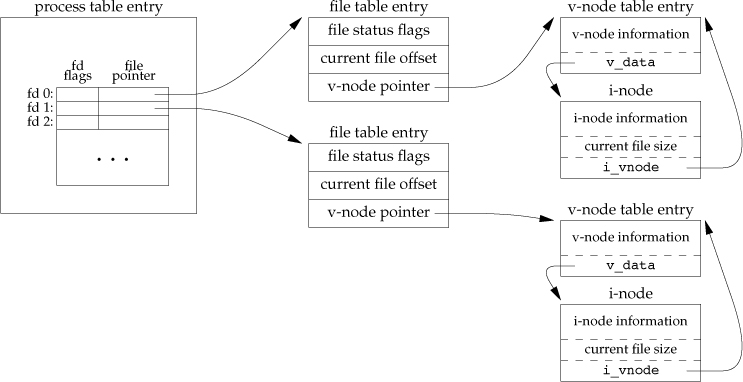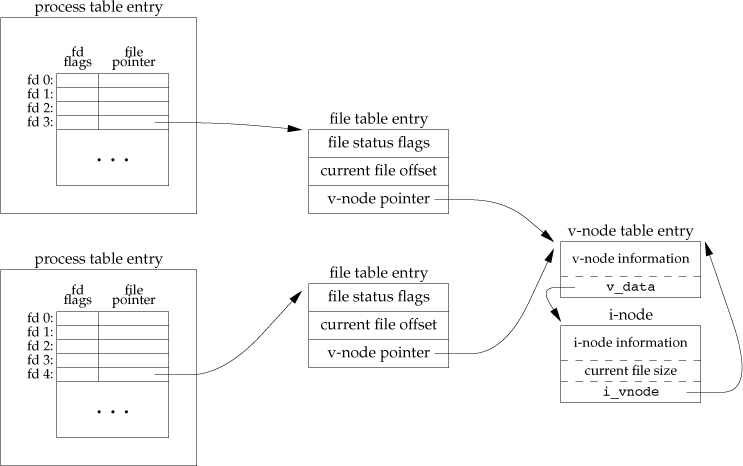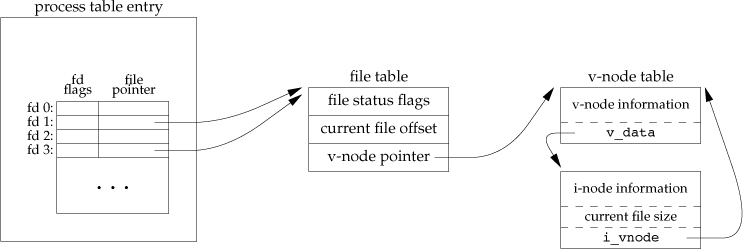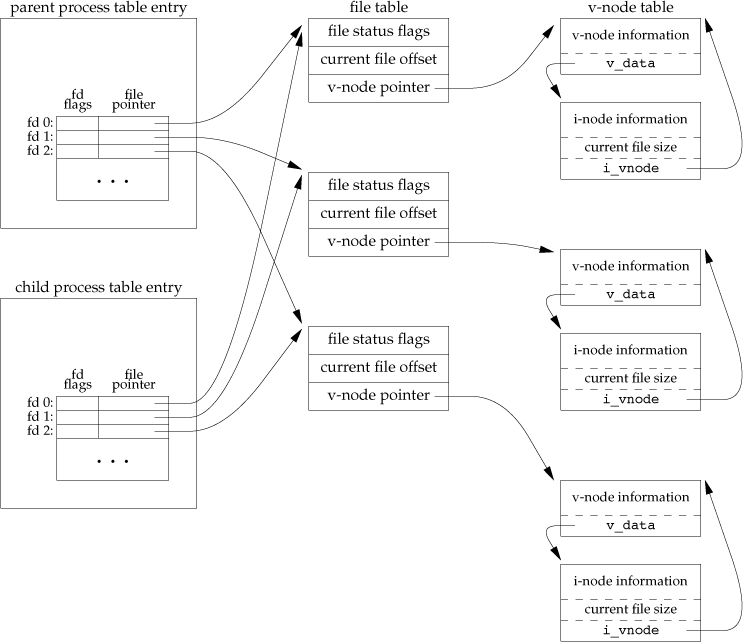COMS W4118 Operating Systems I
UNIX File I/O
File I/O system calls
open
// Need to specify mode if file is being created...
int open(const char *path, int oflag, mode_t mode);
// ...otherwise, mode argument is omitted.
int open(const char *path, int oflag);
oflagmust specify a file access mode optionally bitwise-or’d with other options – seeman 2 open.modespecifies UNIX file permissions via a bitwise-or of user/group/other bit masks – seeman chmod.
Creates an entry in the process’s file descriptor table and returns a file descriptor (the index of the entry in the table). The entry stores the current offset into the file, the open options, and other metadata.
Example (taken from man open in Linux):
#include <fcntl.h>
int fd;
mode_t mode = S_IRUSR | S_IWUSR | S_IRGRP | S_IROTH;
char *pathname = "/tmp/file";
fd = open(pathname, O_WRONLY | O_CREAT | O_TRUNC, mode);
- Open
pathnamefor writing only (O_WRONLY) and delete the contents of the file if any (O_TRUNC). Create the file withmodeif it doesn’t already exist (O_CREAT).
Another example – creating a lock file for distributed synchronization (e.g. multi-process webserver):
fd = open("/var/run/myprog.pid", O_WRONLY | O_CREAT | O_EXCL, 0644);
O_EXCL: error ifO_CREATand the file exists.- Coordination: “primary” process succeeds, “secondary” processes fail.
Note the use of octal notation – 0644 corresponds to S_IRUSR | S_IWUSR |
S_IRGRP | S_IROTH
- visualized easier if you look at the file permissions as if you ran
ls -l:rw-r--r--
creat
Redundant: creat(path, mode) is equivalent to open(path,
O_WRONLY | O_CREAT | O_TRUNC, mode)
And it should have been called create, says Ken Thompson
close
int close(int fildes);
Deletes the file descriptor table entry at index fildes.
lseek
off_t lseek(int fildes, off_t offset, int whence);
- If whence is
SEEK_SET, the file offset shall be set to offset bytes. - If whence is
SEEK_CUR, the file offset shall be set to its current location plus offset. - If whence is
SEEK_END, the file offset shall be set to the size of the file plus offset.
Note that lseek() doesn’t actually do file I/O – it only modifies the file
table entry.
read
ssize_t read(int fildes, void *buf, size_t nbyte);
Returns number of bytes read, 0 if end of file, -1 on error. Number of bytes
read may be less than the requested nbyte – check return value.
read() may block forever on a “slow” read from pipes, FIFOs (aka named pipes),
sockets, or keyboard.
- Note that although performing disk I/O blocks the process and is timewise-slow, we don’t consider that kind of read as a “slow” read – we know it will eventually return.
For sockets, read(socket, buf, nbyte) is equivalent to recv(socket, buf, nbyte, 0):
ssize_t recv(int socket, void *buffer, size_t length, int flags)
- normally,
recv()blocks until it has received at least 1 byte - returns num bytes received, 0 if connection closed, -1 if error
write
ssize_t write(int fildes, const void *buf, size_t nbyte);
Returns number of bytes written, -1 on error. Number of bytes written may be less than the requested nbyte (e.g. filling up a disk).
write() may block forever on a “slow” write into pipes, FIFOs, or sockets
(e.g. see discussion on blocking in man 7 pipe).
For sockets, write(socket, buf, nbyte) is equivalent to
send(socket, buf, nbyte, 0)
ssize_t send(int socket, const void *buffer, size_t length, int flags)
- normally,
send()blocks until it sends all bytes requested - returns num bytes sent or -1 for error
Atomicity (from APUE 3.12): given an operation with multiple steps, either all steps are performed (on success) of none are performed (on failure). Not possible to observe a subset of steps performed.
If the file was opened with O_APPEND flag, the file offset gets set to the end
of the file prior to each write
- setting of the offset and writing happen in an atomic operation (as opposed to
calling
lseek()thenwrite()).
C Standard I/O Library
Wrapping the File I/O API
FILE *fopen(const char *pathname, const char *mode); // open()
int fclose(FILE *stream); // close()
int fseek(FILE *stream, long offset, int whence); // lseek()
size_t fread(void *ptr, size_t size, size_t nmemb, FILE *stream); // read()
size_t fwrite(const void *ptr, size_t size, size_t nmemb, FILE *stream); // write()
Note that FILE *stream replaces int fd – standard I/O is based on streams.
FILE * is an “opaque object” – not meant to be inspected, just passed into API.
- Contains
int fd, buffer pointer/metadata, stream status, etc.
Buffering
Goal: reduce number of read()/write() syscalls while performing stream operations.
- Solution:
fread()/fwrite()callread()/write()once in a while, then use underlying buffer.
Trace syscall invocations via strace:
io.cvsstd-io.c– note how many timesread()is called in each program
File sharing
-
Kernel data structures for open files

Three key data structures:
- Per-process file descriptor table
- File table entry (possibly shared, see later examples). Instance of opened file
- Inode (kernel representation of file)
-
Two independent processes with the same file open

(e.g.
fork-then-open.c)Independent file table entries, but they point to the same inode
-
Kernel data structures after
dup(1)
New file descriptor table slot points to the same file table entry.
-
Sharing of open files between parent and child after
fork
(e.g.
open-then-fork.c)Similar to
dup()– child file descriptor table is constructed as if it weredup()‘d – references parent file table entries.
References
Last updated: 2022-01-25